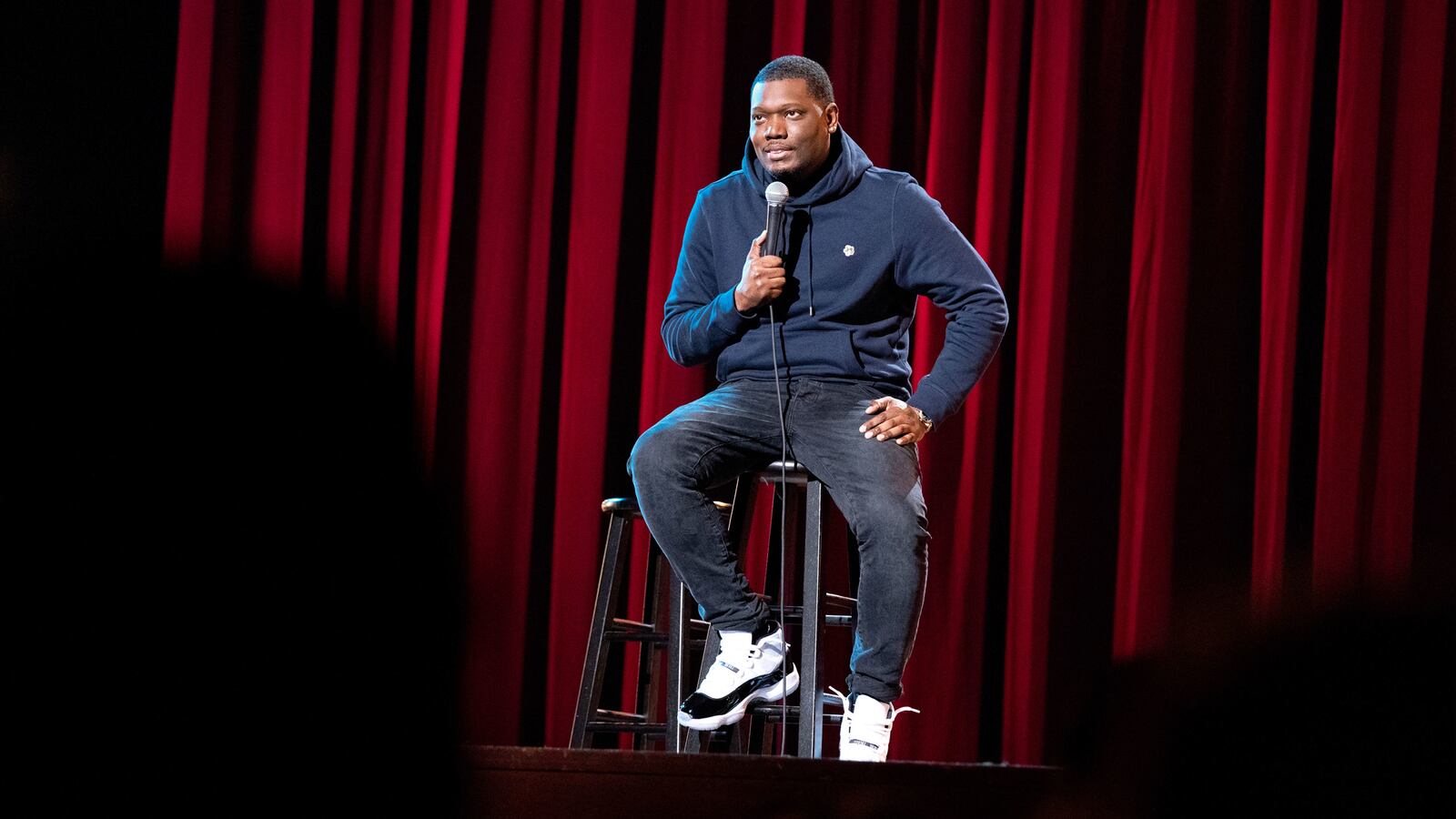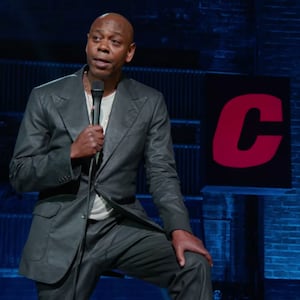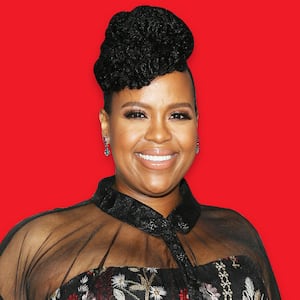In the months leading up to the release of his new Netflix special Shame the Devil this week, comedian Michael Che has been using his provocative Instagram account to promise all kinds of “hoopla” around the new hour.
The co-head writer of Saturday Night Live and co-anchor of “Weekend Update” hyped a potential backlash that would mirror the controversy surrounding Dave Chappelle’s most recent Netflix special The Closer and teased a possible one-on-one with Oprah Winfrey among other high-profile media hits. But when it came time for the big press tour, the “hoopla” was extremely limited.
There was a friendly sit-down with fellow SNL alum Jimmy Fallon on The Tonight Show where Che ribbed his “Update” partner Colin Jost about fathering a child with Scarlett Johansson, a somewhat more in-depth interview with NBC’s Willie Geist, and an expectedly awkward round-table discussion with The View.
It was on that daytime program that co-host Sara Haines had the unenviable task of asking Che to weigh in on Chappelle. After praising the comic as someone who he “admires” a lot and considers a “really, really good friend,” Che seemed like he was about to defend the comedian’s nakedly transphobic jokes before backing off. “Look, I don’t want no trouble, guys,” he said with a shrug.
“Trouble” is a word that comes up a lot in Che’s new special, his first in five years, as he reminds the Oakland audience at the top of the show. Like Chappelle, who faced a walkout from some Netflix employees if few other real-world consequences following his special’s release, Che complains on stage about a handful of times that he “got in trouble” for various jokes—without delineating what that “trouble” looked like or if it had any meaningful effect on his life or career.
The two big examples he gives are the time he told an interviewer that he “liked” Donald Trump after the then-candidate hosted SNL in 2015, and another time when he inadvertently deadnamed Caitlyn Jenner on “Weekend Update” four years later. He declines to bring up the more recent Simone Biles jokes on his Instagram stories that arguably drew even more ire, or the times he’s smeared journalists for the crime of criticizing his or Jost’s material.
With the Trump comments, it seems fairly likely that he was being intentionally provocative. Even on stage in Shame the Devil, he pulls a trick that Chappelle has perfected by delivering an applause line—“I’m kidding, I don’t like Donald Trump”—and then immediately undercutting it with a punchline that makes the audience feel bad for clapping. The basic gist is that he doesn’t “hate” Trump either and reluctantly gives him credit for saying things no other politician would dare.
As far as his previous transgender comments go, Che claims that he didn’t know deadnaming was “a thing” when he told a joke about a “fella named Bruce Jenner” on SNL in the fall of 2019. Of course, by that point Chappelle and other comedians were already facing backlash for their jokes about Jenner’s transition, so it’s hard to believe that Che didn’t know he was deliberately pushing the envelope.
And again, like Chappelle, he makes the decision to double down. “I made a joke about Bruce Jenner the track star instead of Caitlyn Jenner the race car driver,” he jokes. Just in case the crowd didn’t get it, he adds, “I call her a race car driver because she killed somebody with her car.” And then, “Caitlyn Jenner killed somebody with her car and my joke was so bad, America took her side.”
It’s a solid joke that takes gender identity off the table and he stops short of saying anything further that is likely to cause any major uproar online. Che wisely decides not to join Chappelle on “Team TERF,” using female pronouns for Jenner for the rest of the bit. And he makes a fairly convincing case that his jokes about Jenner should not be considered “punching down,” asking, “If I can’t make fun of a rich, white woman, who the fuck can I make fun of?”
“I got in trouble for that one,” he then repeats. “And I learned my lesson, too.” The punchline that follows suggests he might actually be serious.
Shame the Devil is hardly Che’s best material to date and there is a laid-back vibe—he rarely gets up off the stool—that sometimes works to his advantage and sometimes just makes jokes fall flat. But it does contain at least some degree of self-reflection that is almost entirely absent from Chappelle’s latest Netflix special.
The most insightful and illuminating section comes about halfway through when Che explains why he likes to tell “dark” jokes. “I like making fun of dark shit, that’s just how I process information,” he tells the crowd, adding, “Some people like to make sad shit sadder.”
“What’s worse, making fun of something sad or making sad of something fun?” Che asks. “Like, who would you rather hang out with, somebody who’s going to make you laugh about that time you got molested? Or somebody that tells you scrambled eggs are just chicken abortions?”
It’s his fundamental dedication to making jokes that some people are going to be offended by that Che says gets him in so much “trouble.” And there’s nothing inherently wrong with that. Comedians are supposed to push right up to the edge of the line and inevitably cross it on occasion.
When that happens, there can be consequences in the form of criticism—free speech answered by more free speech. And while Che likes to jokingly use #CancelJost on Instagram, he thankfully does not claim to be a victim of cancel culture on stage or elsewhere.
But whether or not the “trouble” Che likes to complain about actually has any teeth, you get the feeling watching his new special that he wouldn’t have it any other way.
For more, listen and subscribe to The Last Laugh podcast.



